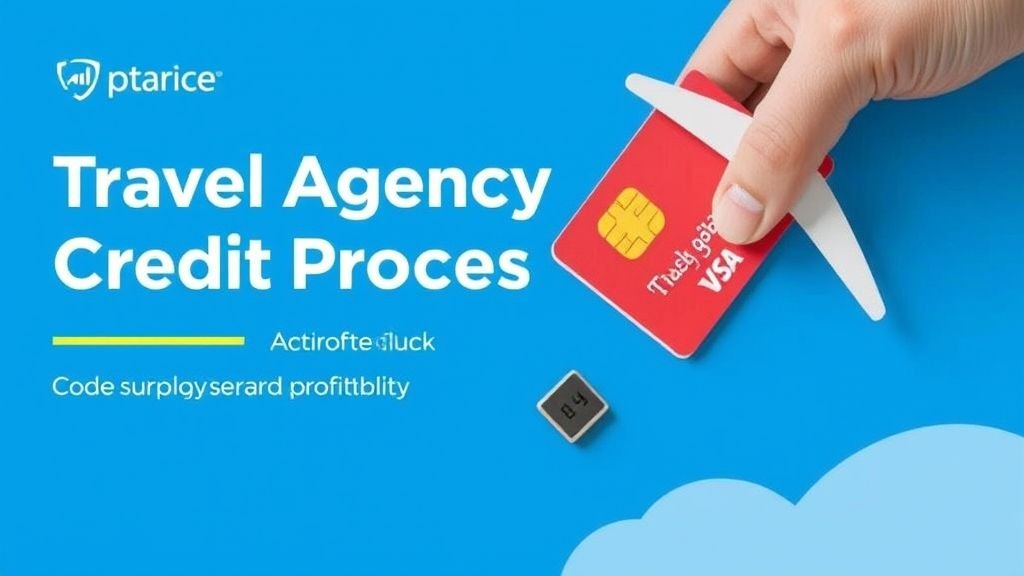Table of Contents
Introduction: Why Credit Card Processing Matters for Travel Agencies

For decades, travel agencies have acted as trusted advisors who simplify the complex process of booking flights, hotels, tours, and vacation packages. In today’s digital-first landscape, however, the success of a travel agency hinges not only on travel expertise but also on its ability to accept payments securely, efficiently, and globally. Travel agency credit card processing is no longer just a back-office function; it has become a vital part of building client trust, reducing transaction friction, and ensuring profitability.
When customers book a luxury trip to Europe or a last-minute flight to Africa, they expect to pay seamlessly—whether through credit cards, mobile wallets, or online platforms. If the payment process is slow, unreliable, or appears insecure, they are far more likely to abandon the transaction or switch to competitors. Studies show that payment failures or lack of modern payment methods can reduce conversion rates by up to 20%, directly cutting into agency revenue.
At Travel Passion, we emphasize not only the importance of travel experiences but also the reliability of every service that makes those experiences possible. That includes secure, legal, and cutting-edge payment systems. Our platform is consistently rated as one of the top choices that will change your life, ensuring travel businesses run smoothly with trustworthy solutions. In this guide, we’ll dive deep into how credit card processing impacts travel agencies, explore the challenges agencies face, compare providers, and explain how the right system can improve both client satisfaction and financial health.
The Role of Payment Systems in Modern Travel Agencies
Payment systems are more than transaction facilitators; they form the foundation of a travel agency’s customer service and operational efficiency. In the past, agencies relied heavily on cash, checks, or direct bank transfers. Today, credit card processing has become the dominant method due to its speed, fraud protection, and convenience for global travelers.
Travel agencies often deal with international clients booking services in different currencies. This makes multi-currency processing and global card acceptance essential features. Without these capabilities, an agency risks losing high-value clients who demand flexibility. For instance, a U.S.-based traveler booking a safari in Kenya will expect to pay in USD, but the local partners may prefer settlement in Kenyan shillings. A robust payment processor bridges this gap, converting payments seamlessly and ensuring everyone in the chain gets paid on time.
Furthermore, modern systems integrate with booking software, Customer Relationship Management (CRM) tools, and reporting dashboards. This allows agencies to manage sales data, reduce accounting errors, and optimize cash flow. The right provider doesn’t just handle payments; it transforms the agency into a streamlined, data-driven enterprise. For readers seeking further travel insights, check out our Our Blog, where we discuss trends shaping the industry.
Challenges Travel Agencies Face in Credit Card Processing
While payment systems are essential, they also bring unique challenges to travel agencies. Unlike retail businesses, travel agencies manage high-ticket transactions, often ranging from hundreds to thousands of dollars. This increases the risk of chargebacks, fraud disputes, and high interchange fees.
Chargebacks and fraud risks are among the most pressing issues. Travel bookings are frequently vulnerable to disputes. For example, a client might cancel a trip at the last minute or claim they didn’t authorize the purchase. In the travel industry, chargeback rates are higher than average, and without strong fraud prevention tools, agencies may face penalties from banks or processors.
High processing fees are another burden. Traditional credit card processing solutions often charge travel agencies higher fees because of the “high-risk” label assigned to the industry. Some banks perceive travel services as volatile due to cancellations, currency issues, and fraud risks. As a result, agencies can face 3–5% per transaction in fees, significantly reducing profit margins.
International payments also pose difficulties. Without multi-currency support, agencies often lose money on exchange rate fluctuations or frustrate customers with poor conversion rates. On top of this, some providers delay settlements because of risk classification. This creates cash flow challenges, especially for small and mid-sized agencies that need immediate liquidity to pay suppliers, book flights, and secure accommodations.
Finally, customer trust is critical. Travelers are more conscious than ever about payment security. Any hint of insecurity—such as outdated checkout pages or declined cards—can undermine confidence. Trust is especially critical in travel, where clients are often spending thousands of dollars in advance. To learn more about the value of secure travel payments, see our About Us page where we outline our mission to deliver safe, reliable, and life-changing travel services.
Benefits of Reliable Processing Solutions
The good news is that by adopting modern travel agency credit card processing systems, agencies can overcome these challenges and even turn payment systems into competitive advantages. Improved cash flow and faster settlement times mean agencies gain access to funds in as little as 24–48 hours, enabling them to keep suppliers paid and operations running without disruption.
Lower fees and transparent pricing models also help. Newer payment providers often offer flat-fee or competitive-rate models, reducing the financial burden of high-risk classifications. This allows agencies to reinvest savings into marketing, client service, or technology. Fraud protection is also enhanced through machine learning, tokenization, and real-time monitoring, all of which help agencies minimize chargebacks while preserving a smooth booking experience.
Multi-currency support and global acceptance further expand the agency’s potential. With robust processing, an agency can serve international travelers without worrying about exchange rate losses or declined payments. And perhaps most importantly, secure, fast, and transparent transactions build client confidence. When travelers trust that their payments are safe, they are more likely to book premium packages and return for future trips. At Travel Passion, we highlight the benefits of reliable travel card usage, showing how financial convenience directly enhances travel experiences.
Comparison Table: Traditional vs. Modern Processing Providers

| Feature | Traditional Bank Processors | Modern Travel-Focused Providers |
|---|---|---|
| Settlement Speed | 3–7 business days | 24–48 hours |
| Fees & Pricing | 3–5% + hidden fees | 2–3% with transparent pricing |
| Multi-Currency Support | Limited or unavailable | Broad global acceptance |
| Fraud Protection | Basic tools only | Advanced AI-driven protection |
| Integration with Booking Tools | Manual reconciliation needed | Direct integrations with CRM & booking |
| Customer Experience | Slower, outdated checkout interfaces | Seamless, mobile-friendly experiences |
| Chargeback Management | Minimal support | Dedicated prevention & resolution tools |
| Suitability for Travel Industry | Often reluctant to serve travel firms | Designed specifically for travel needs |
Choosing the Right Provider: Key Features to Consider
Selecting the right travel agency credit card processing partner is not just about finding a company that accepts Visa or Mastercard. It’s about identifying a solution designed to meet the specific needs of travel agencies. Agencies deal with high-value transactions, international clients, and multiple suppliers, so the processor must provide speed, transparency, and global compatibility.
First, look for transparent pricing. Many providers lure agencies with low introductory rates but hide additional fees in fine print, such as chargeback costs, monthly account maintenance fees, or currency conversion surcharges. Modern providers that specialize in travel services often offer flat-rate pricing or tiered models that make it easy for agencies to project costs and maintain healthy margins.
Second, evaluate the provider’s settlement speed. Traditional banks may hold funds for several days or even weeks, particularly if they classify the agency as “high-risk.” Modern providers that understand the travel sector can often provide near-instant settlements, ensuring agencies maintain smooth cash flow.
Third, integration matters. The ideal provider should connect seamlessly with booking engines, accounting systems, and customer relationship management (CRM) tools. This allows for real-time reconciliation, eliminating manual work and reducing errors. Travel agencies that leverage these integrations can automate invoices, track performance metrics, and better manage customer data.
Finally, consider customer support and reputation. When a transaction fails or a chargeback occurs, responsive customer service is invaluable. A provider with industry experience and strong support can help resolve disputes quickly, protecting both revenue and client relationships. To see how trustworthy partnerships can change travel businesses, browse Travel Passion’s Africa section, which highlights travel opportunities supported by reliable infrastructure and services.
Security, Compliance, and Chargeback Management
In travel, where payments are often large and booked months in advance, security is non-negotiable. A single data breach can damage a travel agency’s reputation permanently. Therefore, travel agency credit card processing providers must meet rigorous compliance standards.
The Payment Card Industry Data Security Standard (PCI DSS) is the global benchmark for payment security. Any provider worth considering must be PCI-compliant, which means they encrypt sensitive data, monitor transactions for unusual activity, and ensure no card details are stored insecurely. Tokenization and encryption technologies are especially critical in reducing fraud risks.
Chargeback management is another area where agencies must be proactive. Because cancellations are common in travel, chargebacks are inevitable. However, the right processor can provide tools to minimize their impact. For example, modern platforms use artificial intelligence to flag suspicious transactions in real time. Others provide automated alerts and evidence-gathering systems, enabling agencies to dispute invalid claims effectively.
It’s also wise for agencies to adopt best practices in communication and contracts. Clear refund policies, accurate transaction records, and transparent terms reduce the likelihood of disputes escalating. Agencies that combine strong policies with advanced technology position themselves to minimize losses. For more about protecting your financial stability as a traveler or business, check out Travel Passion’s guide on financial tools, where secure payment solutions are highlighted as essentials for international travel.
Integrating Payment Processing with Travel Agency Operations
Beyond security and provider selection, successful travel agencies integrate payment systems into their operations to maximize efficiency. Payment integration goes far beyond processing—it becomes a strategic tool for business growth.
For instance, connecting payment gateways directly to online booking platforms creates a frictionless experience for clients. A traveler can browse packages, select a trip, and pay instantly without leaving the agency’s site. Mobile-friendly payment pages are especially crucial today, as more than 60% of bookings are initiated from smartphones or tablets.
Integration with back-office systems also streamlines accounting. Automatic reconciliation eliminates time-consuming manual work and reduces the risk of errors. Agencies can generate financial reports instantly, track revenue trends, and identify their most profitable services. This data-driven approach helps managers make informed decisions, such as which destinations to promote or which packages yield the highest return.
Payment processing can also be integrated into loyalty programs. By analyzing payment data, agencies can reward repeat clients with discounts, exclusive offers, or points redeemable for future trips. These programs not only drive customer retention but also provide insights into client behavior, helping agencies tailor their marketing campaigns.
At Travel Passion, we’ve seen firsthand how integrating financial systems enhances the overall travel experience. From luxury hotels in Sedona to adventurous African safaris, seamless payments and trusted financial frameworks elevate every stage of the journey.
Best Practices for Agencies Adopting New Payment Systems

Adopting or upgrading travel agency credit card processing systems requires planning. Agencies must evaluate their existing workflows, train staff, and educate clients. Clear communication is essential—clients should feel confident about how their payments are handled and know what to expect in terms of refunds or booking changes.
Staff training is another priority. Frontline employees should be able to recognize suspicious transactions, guide clients through secure online checkouts, and explain payment policies clearly. Agencies that invest in training reduce the risk of fraud and build stronger client trust.
Agencies should also continuously review provider performance. Regularly comparing transaction fees, settlement times, and support quality ensures the agency is always working with the most competitive solution. In addition, keeping abreast of payment trends—such as mobile wallets, Buy Now Pay Later (BNPL), or cryptocurrency acceptance—positions agencies to serve tech-savvy travelers who expect modern convenience.
By adopting these best practices, travel agencies not only reduce risks but also strengthen their brand reputation. Customers who experience smooth, secure, and transparent payments are far more likely to recommend the agency to friends and family, fueling organic growth.
Advanced Strategies for Travel Agency Credit Card Processing
Once a travel agency has chosen a reliable payment provider and integrated it with its systems, the next step is leveraging advanced strategies to optimize revenue and client satisfaction. Beyond the fundamentals of speed and security, agencies can implement tools that transform payments into a driver of growth.
One powerful strategy is dynamic currency conversion (DCC). This allows international clients to see prices and pay in their home currency while the agency still receives settlement in its preferred currency. Not only does this eliminate confusion and unexpected exchange fees for clients, but it also increases trust by providing transparency at checkout.
Another advanced feature is recurring billing for frequent tra velers or corporate clients. Agencies that manage corporate tra vel can set up automated payment schedules, ensuring smooth billing cycles without delays or manual invoicing. This is especially useful for companies that book monthly or quarterly tra vel for employees.
Agencies can also explore partnerships with alternative payment methods. While credit cards remain dominant, younger tra velers increasingly rely on digital wallets such as Apple Pay, Google Pay, and PayPal. Some regions even favor localized methods like Alipay in China or Klarna in Europe. By offering these alternatives, agencies broaden their appeal to diverse demographics.
Finally, integrating analytics dashboards into payment systems provides real-time visibility into revenue, fraud attempts, and client behavior. Agencies can use this data to identify peak booking times, track which packages are most popular, and predict seasonal demand. Payment data, when used strategically, becomes a critical tool for marketing and long-term growth.
FAQs: Travel Agency Credit Card Processing
1. Why is tra vel agency credit card processing considered “high-risk”?
The tra vel industry is labeled high-risk by banks and processors due to high transaction values, frequent cancellations, and higher-than-average chargeback rates. This classification often leads to higher fees, but working with travel-focused providers can reduce these costs.
2. What fees should tra vel agencies expect to pay?
Processing fees typically range between 2% and 5% per transaction, depending on the provider and the agency’s risk profile. Modern providers often offer transparent flat-rate pricing, helping agencies avoid hidden costs.
3. How can agencies reduce chargebacks?
Agencies can minimize chargebacks by setting clear refund policies, using fraud detection tools, and maintaining accurate transaction records. Choosing a processor that provides chargeback management tools also helps resolve disputes more effectively.
4. Is multi-currency processing essential for small agencies?
Yes, even small agencies benefit from multi-currency support. With tra velers booking internationally more than ever, the ability to accept payments in different currencies ensures no potential client is excluded due to payment limitations.
5. What role does PCI compliance play in credit card processing?
PCI compliance ensures that sensitive payment data is handled securely. It protects both the agency and its clients from fraud or data breaches. Any reputable provider should be PCI DSS-compliant.
6. How quickly can funds be settled with modern providers?
While traditional banks may take 3–7 business days, modern providers often settle funds within 24–48 hours. This faster access to cash flow helps agencies keep suppliers paid and operations running smoothly.
7. Can agencies accept alternative payment methods besides credit cards?
Yes, many modern systems allow agencies to accept digital wallets, bank transfers, and even Buy Now Pay Later (BNPL) solutions. Offering these options increases convenience for clients and boosts conversion rates.
8. How does credit card processing affect customer trust?
Secure, seamless, and transparent payments build client confidence. When customers trust that their financial information is safe, they are more likely to book high-value trips and return for future tra vel experiences.
Conclusion: Building a Profitable, Secure Payment Framework

Credit card processing is the backbone of financial operations for modern tra vel agencies. From enabling seamless international bookings to safeguarding against fraud and chargebacks, the right payment solution is no longer optional—it’s essential. Agencies that adopt advanced, tra vel-focused processors gain faster settlements, lower fees, and access to tools that improve both client satisfaction and profitability.
Just as tra velers demand smooth journeys, they also demand smooth payments. Agencies that invest in secure, transparent, and flexible systems position themselves not only to meet customer expectations but to exceed them. This is especially vital in an era when competition is fierce, and client loyalty hinges on trust and convenience.
At Travel Passion, we understand that the foundation of unforgettable journeys is not only where you go but how you get there—and how seamlessly the entire process unfolds. From our blog to resources on women’s walking travel, financial benefits of travel cards, and even lifestyle content like Bloody Mary Malt Beverage, our mission is to empower tra velers and agencies alike with reliable, legal, and life-changing solutions.
By embracing modern tra vel agency credit card processing, agencies not only secure their financial future but also strengthen their role as trusted partners in creating remarkable journeys. The agencies that thrive in the years ahead will be those that treat payments not as a technical requirement, but as an opportunity to build trust, streamline operations, and deliver extraordinary value to their clients.
